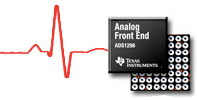TI supports mobile heart and brain measurements with new chip


If you have ever had one of these heart (ECG) or brain (EEG) tests done, as I have, you know what a nightmare they are. The device is brought in on a cart, a bunch of wires are affixed to your whole body, and a quick snapshot is taken.
If the main unit can be made wearable, it may be possible to use wireless technology between it and the necessary sensors to enable more regular testing, movies instead of snapshots in some cases.
TI says the new chip reduces the size of an ECG or EEG board by 95%, with higher reliability.
Art George, a vice president for TI's analog products business unit, is clear on what this means:
This will make it easier for doctors to monitor vital parameters over the long term for more accurate clinical data, while increasing patient comfort with devices that can easily be carried, concealed or worn."
Heart and brain movies instead of heart and brain snapshots. This means intermittent anomalies in heart and brain function can be detected, even tracked, resulting in better diagnosis and more accurate treatment, for less money.
The initial price on the new chip is about $24 in quantities as low as 1,000. TI is also providing a medical kit to accelerate product development, so you could see this new gear in your salesman's brochure as early as this fall.
This is a seriously big deal. Cheap, regular, portable heart and brain monitoring, rather than intermittent, hospital-and-clinic based monitoring, is going to revolutionize many aspects of medicine over the next several years.